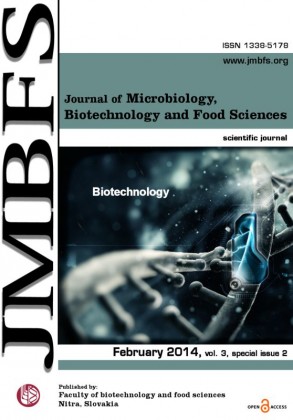REDUCTION OF HERBICIDE AND WATER STRESS IN SPRING BARLEY BY REGULATORS OF POLYAMINE BIOSYNTHESIS
Keywords:
herbicide, barley, polyamine, γ-aminobutyric acidAbstract
The experiment was carried out under artificial light of fluorescent lamps starting with 60 % full water capacity which was afterwards decreased on 40 % and finally the plants of barley were not watered. 30 plants of this cereal after plant emergence were thinned on 22 pieces. Experiment was treated by triazine herbicide, as well as its mixtures of regulators of polyamine synthesis: γ-aminobutyric acid, 1.3-propylenediamine dihydrochloride and salicyl acid. Solo application of triazine herbicide during water stress had negative balance on formation of root and above ground biomass. Addition of regulators of polyamine synthesis had positive effects on mentioned parameters, but not in comparison to control variant. These stress factors were eliminated most significantly only the application of GABA (100 g.ha-1) in mixture with herbicide.Downloads
Download data is not yet available.
Downloads
Published
2014-02-01
How to Cite
Trebichalský, P., Harangozo, ĽuboÅ¡, Tóth, T., Bystrická, J., & Musilová, J. (2014). REDUCTION OF HERBICIDE AND WATER STRESS IN SPRING BARLEY BY REGULATORS OF POLYAMINE BIOSYNTHESIS. Journal of Microbiology, Biotechnology and Food Sciences, 3(special issue 2 (Biotechnology), 171–173. Retrieved from https://office2.jmbfs.org/index.php/JMBFS/article/view/7647
Issue
Section
Biotechnology
License
Copyright (c) 2014 Pavol Trebichalský, ĽuboÅ¡ Harangozo, Tomáš Tóth, Judita Bystrická, Janette Musilová

This work is licensed under a Creative Commons Attribution 4.0 International License.
All papers published in the Journal of Microbiology, Biotechnology and Food Sciences are published under a CC-BY licence (CC-BY 4.0). Published materials can be shared (copy and redistribute the material in any medium or format) and adapted (remix, transform, and build upon the material for any purpose, even commercially) with specifying the author(s).

